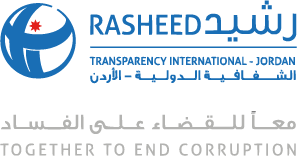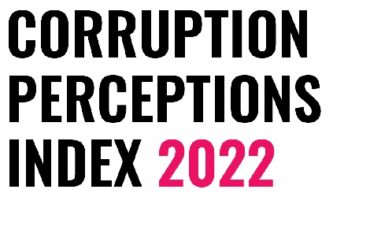Rasheed for Integrity and Transparency (Transparency International Jordan) launching today the results of the Global Corruption Barometer, which represents a survey of the public opinion on corruption, and their experience in paying bribes. In addition to capturing their assessment of the level of corruption in the most prominent institutions and the efforts made by the government in fighting corruption.
The Global Corruption Barometer is based on a questionnaire designed by Transparency International; it contains multiple questions through which the public’s perception of the level of corruption in the country is recognized. Transparency International annually updates this questionnaire, accordingly, results from previous years can’t be compared even for the same country due to these updates in the questionnaire. Transparency International appoints and delegates specialized research and survey companies to conduct the questionnaire. In Jordan, Transparency International selected NAMA Strategic Intelligence Solutions based on certain criteria to conduct the survey and the data collection for this year and NAMA finished conducting the survey in mid of August 2019.
After analyzing the data collected it was noted that 4 percent of the respondents reported paying bribes for accessing public services, while 25 percent of the respondents reported using (nepotism/ favoritism) (hereunder referred to as “Wasta”) to obtain the same services. The results also showed that 55 percent of the respondents believe that corruption is increasing in Jordan, while 13 percent said that they have experienced and/or know people who have experienced sexual bribery and understand that part of bribery. While 26 percent of the respondents stated that, they were offered a bribe or a special favor to influence their voting decision in the elections.
The results of the questionnaire, as reported by respondents in regards to Wasta and bribery in public services, were as follows:
In the education sector, 4 percent of the respondents reported that they had to pay a bribe, present a gift, or provide a service to the school’s teacher or administrator in order to access the needed services, while 15 percent of the respondents said they had to use Wasta to obtain the same services.
In the health sector, 1 percent of the respondents reported that they paid a bribe in exchange for getting medical services, while 20 percent of the respondents stated that during the previous twelve months they used the Wasta to access/ get these health/medical services.
As for obtaining official papers and governmental approvals, 2 percent of the respondents reported that they had paid a bribe to obtain a document from a governmental institution such as (birth certificate, driver’s license, passport, or any permit from a governmental institution); while 13 percent of the respondents reported that, they used Wasta to obtain these documents.
when obtaining basic government services such as: (water, sewage or electricity), it was found that 5 percent of respondents had to pay a bribe in order to access such services, while 21 percent of respondents used Wasta to access the same services.
When the respondents were asked about having to pay a bribe or present a gift or a service to a police officer in order to obtain assistance, or to avoid applying the procedures or passing a checkpoint or avoid arrest or paying a ticket; 2 percent of them reported that they did. While 15 percent of respondents reported, using Wasta to get these services or avoid consequences.
In the judicial sector, the percentage of respondents that reported paying a bribe and/or present a gift to a judge or judicial official in order to obtain the assistance they could get from courts or even avoid any problem reached 0 percent of the total respondents. While 16 percent of the respondents reported, using Wasta in order to access and/or avoid the aforementioned from the judicial authorities.
When the respondents were asked about their belief in the involvement of individuals or institutions in corruption, the results of the questionnaire showed that respondents believe that 45 percent of the members of parliament (representatives and Senates) are involved in corruption cases. 36 percent of government officials, 28 percent of members of local and decentralized councils, and 25 percent of employees and members’ prime ministry are involved in corruption cases, in addition to 17 percent of the religious actors/ clergy. While 38 percent of respondents believe that businesspersons are involved in corruption cases, 22 percent of those involved in corruption cases, according to the opinion of respondents, are in NGOs. 21 percent of bankers are involved in corruption. The judges got the lowest percentage, where 12 percent of the judiciary is to perceive involved in corruption.
In regards to the respondents’ view of corruption, 86 percent of the total saw corruption as a major problem, while 13 percent of respondents saw corruption as a small problem. In addition, 55 percent of the respondents said that corruption is increasing, While 17 percent of respondents say that the problem of corruption is decreasing.
Regarding the elections, 85 percent of respondents said they believe that voters receive money or are given special favors to vote in a specific way. 26 percent of the respondents reported that someone had tried to offer them a bribe or a special favor in order to vote in a specific way in national or local elections. While 3 percent of the respondents were threatened with some form of reprisal if they did not vote for a particular person or a specific party in the elections. Moreover, 59 percent of the respondents said that there was fake news circulating in the elections.
When the respondents were asked about their fear of retaliation or any other negative consequences in case they reported any cases of corruption, 61 percent of them reported that they had a fear of retaliation and/or a risk in the event of reporting corruption, while 36 percent of respondents reported that they had no fear of retaliation in they reported corruption cases.
Regarding the consequences of submitting a report, 48 percent of the respondents believe that it is unlikely that suitable actions will be taken against the corrupted individuals, while 49 percent of the respondents believe that it is possible that appropriate actions will be taken against them.
The questionnaire revealed that 16 percent agree with the phrase that if a government official reports a state of corruption, it is more likely that appropriate measures will be taken if a man, not a woman, files the complaint, while 74 percent of them did not agree with this statement.
50 percent of the respondents agreed that ordinary people had an impact on fighting corruption, while 42 percent responded otherwise.
As for assessing the government’s performance in the field of anti-corruption, 55 percent of the respondents’ reported that the performance is good while 43 percent of them answered that it is weak.
About Rasheed:
Rasheed (Transparency International – Jordan) is a non-profit company that was established in 2013, working to strengthen the pillars of good governance that are based on integrity, transparency, accountability, and rule of law in Jordanian institutions. Rasheed (TI – JO) is the national chapter of Transparency International in Jordan.
Rasheed (TI – JO) aims to reinforce the involvement of Jordanian citizens in anti-corruption activities, protect public, private and local governance institutions against corruption, enhance the efficiency and independence of control agencies specialized in the area of anti-corruption, and strengthen the integrity of the legislative and judicial authorities.
About Transparency International:
Transparency International is a coalition of civil society organizations whose goal is to fight corruption and promote good governance. Founded in 1993 as a non-profit organization with 100 offices around the world, some of Transparency International publications are the (Corruption Perceptions Index CPI) and the Global Corruption Barometer as well as the Bribery Guide, Transparency international played a key role in the preparation of the United Nations Convention against Corruption, which was ratified by Jordan in 2004, in addition to the OECD Convention against Bribery.




